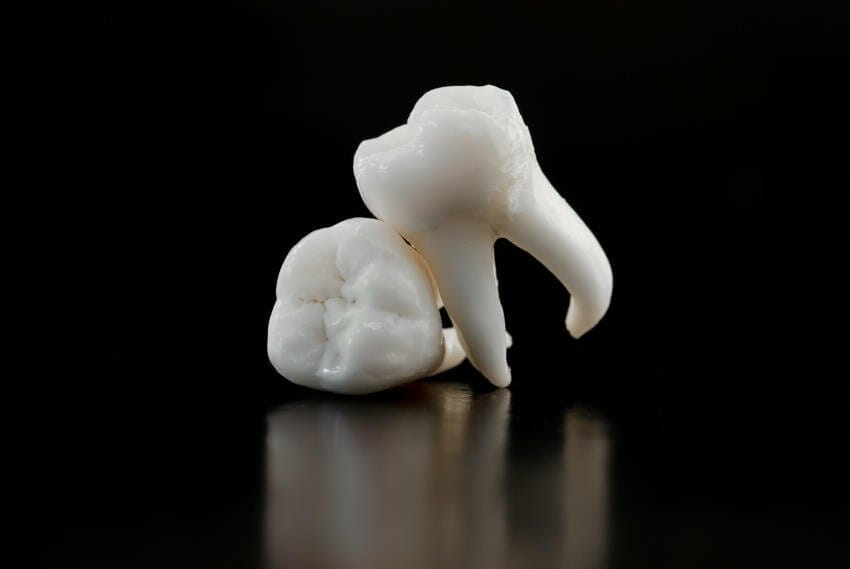
Assessment and recommendation for wisdom tooth removal is one of the least standardized processes in Dentistry. It is very specific to each treating Dentist. Dentists have a wide variety of philosophies about wisdom tooth removal. Some are more conservative while others are more intervention-oriented. The best outcomes come from a thorough discussion of risks and benefits takes place between Family Dentist and patient.
Below, I hope to demystify all things "wisdom teeth" by answering your most commonly asked questions!
"Wisdom Teeth" are your third set of molars that commonly come in around 18-24 years of age. In many cases, these teeth do not have the room necessary to properly erupt. This means the wisdom teeth cannot fit. When these teeth are likely to become stuck during eruption (this is called "impaction"), your Family Dentist will recommend wisdom tooth removal or extraction.
Sometimes. If your wisdom teeth have enough space to erupt properly into a cleansible and maintainable position, there is no need for extraction. If they are impacted or are likely to become impacted you may be at risk of:
Yes. The pressure from eruption of these teeth can lead to jaw pain and headaches. Luckily, the period of discomfort tends to be short. Pain and headaches associate with wisdom tooth eruption is not an indication for removal.
This is very difficult to achieve. Typically, these teeth have only a small amount of their crown visible through the gums. Under the gums, there will be a deep gum pocket surrounding the tooth. This pocket traps dissolved food, plaque, and bacteria. Ultimately, these contaminants can lead to infection and pain.
The best way to clean around an impacted wisdom tooth is to rinse or irrigate with a plastic syringe and Scope or Listerine mouth rinse. This can remove contaminants that collect in deep gum pockets around your wisdom teeth.
Treatment costs depend on whether removal is conducted by your Family Dentist (not all family dentists provide this service) or an Oral Surgeon. The overall cost also depends on whether you will choose sedation (laughing gas, oral sedation, general anesthetic) or not. Finally, the cost of treatment depends on whether teeth are impacted and require surgical removal or if they are erupted and require "uncomplicated extraction".
Generally, the removal of 4 erupted wisdom teeth without sedation will cost about $600 - $800 (or $150 - $200 per tooth). Removal of 4 impacted wisdom teeth is typically closer to $1,200 - $1,500. These fees are for treatment by a General or Family Dentist. Specialist or Oral Surgeon fees are higher. Not all practitioners follow the Ontario Dental Association Fee guide. Thus, prices can vary substantially. To get a precise estimate of costs, I suggest arranging a consult with your Family Dentist.
No. Wisdom teeth extraction should occur under conditions of total numbness. Your Family Dentist will check in with you regularly during the procedure to ensure that you are comfortable.
Healing from surgical extraction can be uncomfortable in the absence of a proper pain management regimen. Typically your Family Dentist will prescribe pain control medication to ensure your comfort during healing.
Following extraction of wisdom teeth, a hole or extraction socket exists in your tooth's place. However, over a period of 4-6 weeks, bone will fill in the socket. Connective tissue will heal over top of the bone and your gums will completely cover the extraction site. Initially, this area will feel soft but as the new bone matures underneath the gums, things will begin to feel more firm.
After wisdom tooth extraction, you'll be a bit tender. You're going to appreciate foods that aren't too hot, too hard, or that require a lot of heavy chewing. Heat can stimulate bleeding or cause tissue burns; hard and brittle foods can scrape and irritate healing gums; and chewy foods can require a stiff and tender jaw to do more work than it's ready for.
So what foods do we recommend for the first 2-3 days following wisdom tooth removal?
Here's a great list:
Try to stay away from nuts, granola, chips and other sharp brittle foods that can dig in to the tender, swollen gums around a healing site.
Swelling commonly occurs following extraction of impacted wisdom teeth (it is not common after extraction of erupted wisdom teeth). This occurs following removal of bone and gum tissue that covers the third molar. This tissue removal makes tooth extraction easier. You can control swelling by frequently icing sides of the face. Occasionally, bruising and jaw stiffness will accompany swelling. This is normal and will diminish over 5-7 days in most cases.
Yes. This is a very remote and uncommon risk that comes with upper wisdom tooth extraction. The roots of upper wisdom teeth are close to the floor of your sinus cavities. During upper third molar removal, a small portion of the sinus floor can tear. This can allow oral bacteria to enter your sinus leading to infection. Typically, a Family Dentist will prescribe low dose antibiotics following your procedure to reduce the risk of sinus infection.
If you would like to have your wisdom teeth assessed, please feel free to request a consult with me here. I look forward to meeting with you!
This article is intended to promote understanding of and knowledge about general oral health topics. It is not intended to be a substitute for professional advice, diagnosis or treatment. Always seek the advice of your Kitchener Dentist or other qualified healthcare provider with any questions you may have regarding a dental condition or treatment.
Services
Routine Dentistry & Tooth Repair
Oral Surgery & Tooth Removal
Prosthetic Dentistry & Tooth Replacement
Protective/Preventive Services
Teeth Whitening
Schedule an Appointment Now
